Courses

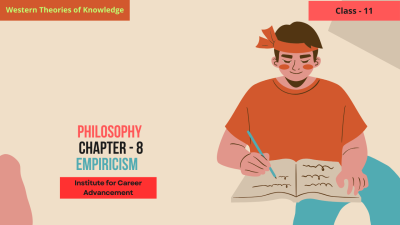
 Compare
Compare
Empiricism is a philosophical theory that emphasizes the importance of experience and evidence, particularly sensory perception, as the source of all knowledge. Key characteristics of empiricism include: Primacy of Experience: Experience, especially sensory experience, is considered the primary source of knowledge. Rejection of Innate Ideas: Empiricists reject the notion of innate ideas, arguing that all knowledge originates from experience. Inductive Reasoning: Inductive reasoning, which involves drawing general conclusions from specific observations, is considered a crucial method for acquiring knowledge. A Posteriori Knowledge: Empiricists emphasize the importance of a posteriori knowledge, which is knowledge that is derived from experience. Some prominent empiricist philosophers include: John Locke: Argued that the mind is a blank slate (tabula rasa) at birth and that all knowledge is acquired through experience. George Berkeley: Believed that reality is mind-dependent and that objects exist only insofar as they are perceived. David Hume: Emphasized the importance of observation and experience, arguing that causality is a habit of mind rather than a necessary connection between events. Empiricism has had a profound impact on various fields of thought, including science, psychology, and epistemology. It continues to be a significant philosophical perspective and plays a crucial role in shaping our understanding of knowledge and reality. অভিজ্ঞতাবাদ একটি দার্শনিক তত্ত্ব যা সমস্ত জ্ঞানের উৎস হিসাবে অভিজ্ঞতা এবং প্রমাণ, বিশেষত সংবেদনশীল উপলব্ধির গুরুত্বের উপর জোর দেয়। অভিজ্ঞতার মূল বৈশিষ্ট্যগুলির মধ্যে রয়েছেঃ অভিজ্ঞতার অগ্রাধিকারঃ অভিজ্ঞতা, বিশেষ করে সংবেদনশীল অভিজ্ঞতাকে জ্ঞানের প্রাথমিক উৎস হিসাবে বিবেচনা করা হয়। সহজাত ধারণাগুলির প্রত্যাখ্যানঃ অভিজ্ঞতাগণ সহজাত ধারণাগুলির ধারণাকে প্রত্যাখ্যান করেন, যুক্তি দেন যে সমস্ত জ্ঞান অভিজ্ঞতা থেকে উদ্ভূত হয়। আবেগময় যুক্তিঃ আবেগময় যুক্তি, যার মধ্যে নির্দিষ্ট পর্যবেক্ষণ থেকে সাধারণ সিদ্ধান্ত নেওয়া জড়িত, জ্ঞান অর্জনের জন্য একটি গুরুত্বপূর্ণ পদ্ধতি হিসাবে বিবেচিত হয়। উত্তরসূরি জ্ঞানঃ অভিজ্ঞতাসম্পন্ন ব্যক্তিরা উত্তরসূরি জ্ঞানের গুরুত্বের উপর জোর দেন, যা হল অভিজ্ঞতা থেকে প্রাপ্ত জ্ঞান। কিছু বিশিষ্ট অভিজ্ঞতাসম্পন্ন দার্শনিকের মধ্যে রয়েছেঃ জন লকঃ যুক্তি দিয়েছিলেন যে জন্মের সময় মন একটি ফাঁকা স্লেট (ট্যাবুলারাস) এবং সমস্ত জ্ঞান অভিজ্ঞতার মাধ্যমে অর্জিত হয়। জর্জ বার্কলিঃ বিশ্বাস করতেন যে বাস্তবতা হল মন-নির্ভর এবং বস্তুগুলি যতদূর উপলব্ধি করা হয় ততদূর পর্যন্তই বিদ্যমান। ডেভিড হিউমঃ পর্যবেক্ষণ এবং অভিজ্ঞতার গুরুত্বের উপর জোর দিয়েছিলেন, যুক্তি দিয়েছিলেন যে কার্যকারিতা ঘটনাগুলির মধ্যে প্রয়োজনীয় সংযোগের পরিবর্তে মনের একটি অভ্যাস। অভিজ্ঞতাবাদ বিজ্ঞান, মনোবিজ্ঞান এবং জ্ঞানতত্ত্ব সহ চিন্তার বিভিন্ন ক্ষেত্রে গভীর প্রভাব ফেলেছে। এটি একটি উল্লেখযোগ্য দার্শনিক দৃষ্টিভঙ্গি হিসাবে অব্যাহত রয়েছে এবং জ্ঞান ও বাস্তবতা সম্পর্কে আমাদের বোধগম্যতা গঠনে গুরুত্বপূর্ণ ভূমিকা পালন করে।
0 Lessons
Hours

 Compare
Compare
Rationalism is a philosophical view that emphasizes reason as the primary source and test of knowledge. Rationalists believe that true knowledge can be acquired through logical reasoning and deduction, rather than solely relying on sensory experience or empirical evidence. Key characteristics of rationalism include: Primacy of Reason: Reason is considered the most reliable and trustworthy source of knowledge. Innate Ideas: Rationalists believe that certain fundamental ideas, such as mathematical principles and basic logical truths, are innate to the human mind. Deductive Reasoning: Deductive reasoning, which involves deriving specific conclusions from general principles, is considered the most effective method for acquiring knowledge. A Priori Knowledge: Rationalists emphasize the importance of a priori knowledge, which is knowledge that is independent of sensory experience. Some prominent rationalist philosophers include: Plato: Argued for the existence of abstract Forms, which are perfect and unchanging entities that exist independently of the physical world. René Descartes: Famous for his dictum "I think, therefore I am," Descartes emphasized the power of reason to establish certain truths with certainty. Gottfried Wilhelm Leibniz: Believed in the principle of sufficient reason, which states that there is a reason for everything that exists. Rationalism has had a profound impact on various fields of thought, including mathematics, science, and ethics. It continues to be a significant philosophical perspective and plays a crucial role in shaping our understanding of knowledge and reality. যুক্তিবাদ হল একটি দার্শনিক দৃষ্টিভঙ্গি যা জ্ঞানের প্রাথমিক উৎস এবং পরীক্ষা হিসাবে যুক্তির উপর জোর দেয়। যুক্তিবাদীরা বিশ্বাস করেন যে শুধুমাত্র সংবেদনশীল অভিজ্ঞতা বা অভিজ্ঞতাগত প্রমাণের উপর নির্ভর করার পরিবর্তে যৌক্তিক যুক্তি এবং অনুমানের মাধ্যমে সত্য জ্ঞান অর্জন করা যেতে পারে। যুক্তিবাদের প্রধান বৈশিষ্ট্যগুলির মধ্যে রয়েছেঃ যুক্তির প্রাধান্য-যুক্তিকে জ্ঞানের সবচেয়ে নির্ভরযোগ্য এবং বিশ্বাসযোগ্য উৎস হিসাবে বিবেচনা করা হয়। সহজাত ধারণাঃ যুক্তিবাদীরা বিশ্বাস করেন যে কিছু মৌলিক ধারণা, যেমন গাণিতিক নীতি এবং মৌলিক যৌক্তিক সত্য, মানুষের মনের সহজাত। ডিডাক্টিভ রিজনিংঃ ডিডাক্টিভ রিজনিং, যা সাধারণ নীতিগুলি থেকে নির্দিষ্ট সিদ্ধান্ত গ্রহণের সাথে জড়িত, জ্ঞান অর্জনের জন্য সবচেয়ে কার্যকর পদ্ধতি হিসাবে বিবেচিত হয়। একটি প্রিয়োরি জ্ঞানঃ যুক্তিবাদীরা একটি প্রাথমিক জ্ঞানের গুরুত্বের উপর জোর দেয়, যা জ্ঞান যা সংবেদনশীল অভিজ্ঞতা থেকে স্বাধীন। কিছু বিশিষ্ট যুক্তিবাদী দার্শনিকের মধ্যে রয়েছেঃ প্লেটোঃ বিমূর্ত রূপের অস্তিত্বের পক্ষে যুক্তি দিয়েছিলেন, যা নিখুঁত এবং অপরিবর্তনীয় সত্তা যা ভৌত জগত থেকে স্বাধীনভাবে বিদ্যমান। রেনে ডেসকার্টেসঃ তাঁর উক্তিটির জন্য বিখ্যাত "আমি মনে করি, তাই আমি আছি", ডেকার্ট নিশ্চিতভাবে কিছু সত্য প্রতিষ্ঠার যুক্তির শক্তির উপর জোর দিয়েছিলেন। গটফ্রিড উইলহেম লিবনিজঃ যথেষ্ট কারণের নীতিতে বিশ্বাস করেন, যা বলে যে বিদ্যমান সমস্ত কিছুর একটি কারণ রয়েছে। গণিত, বিজ্ঞান এবং নীতিশাস্ত্র সহ চিন্তার বিভিন্ন ক্ষেত্রে যুক্তিবাদ গভীর প্রভাব ফেলেছে। এটি একটি উল্লেখযোগ্য দার্শনিক দৃষ্টিভঙ্গি হিসাবে অব্যাহত রয়েছে এবং জ্ঞান ও বাস্তবতা সম্পর্কে আমাদের বোধগম্যতা গঠনে গুরুত্বপূর্ণ ভূমিকা পালন করে।
0 Lessons
Hours
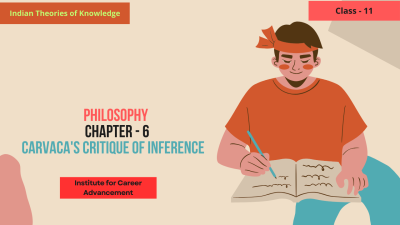
 Compare
Compare
The Carvaka school, a materialistic and skeptical school of Indian philosophy, offers a critique of inference (Anumana). They argue that inference is not a reliable source of knowledge and can lead to erroneous conclusions. Their main criticisms include: Circular Reasoning: They argue that inference often relies on other inferences, leading to a circular chain of reasoning without any solid foundation. Infinite Regression: They contend that the justification of any inference would require another inference, leading to an infinite regression of justifications. Subjectivity: They point out that inferences are subjective and can vary from person to person, making them unreliable. Lack of Empirical Basis: They argue that inferences are often based on assumptions and speculations rather than direct empirical evidence. The Carvaka philosophers emphasize the importance of direct perception (Pratyaksha) as the only reliable source of knowledge. They reject any knowledge claim that cannot be directly verified through sensory experience. কারভাক মতবাদ, ভারতীয় দর্শনের একটি বস্তুবাদী এবং সংশয়ী মতবাদ, অনুমানের সমালোচনা করে (অনুমানা) তারা যুক্তি দেয় যে অনুমান জ্ঞানের একটি নির্ভরযোগ্য উৎস নয় এবং ভুল সিদ্ধান্তে নিয়ে যেতে পারে। তাদের প্রধান সমালোচনাগুলির মধ্যে রয়েছেঃ বৃত্তাকার যুক্তিঃ তারা যুক্তি দেয় যে অনুমান প্রায়শই অন্যান্য অনুমানের উপর নির্ভর করে, যার ফলে কোনও শক্ত ভিত্তি ছাড়াই যুক্তির একটি বৃত্তাকার শৃঙ্খল তৈরি হয়। অসীম প্রত্যাবর্তনঃ তারা দাবি করে যে, যে কোনও অনুমানের ন্যায্যতার জন্য আরেকটি অনুমানের প্রয়োজন হবে, যা ন্যায্যতার একটি অসীম প্রত্যাবর্তনের দিকে পরিচালিত করবে। বিষয়গততাঃ তারা নির্দেশ করে যে অনুমানগুলি বিষয়গত এবং ব্যক্তিভেদে পরিবর্তিত হতে পারে, যা তাদের অবিশ্বস্ত করে তোলে। অভিজ্ঞতাগত ভিত্তির অভাবঃ তারা যুক্তি দেয় যে অনুমানগুলি প্রায়শই প্রত্যক্ষ অভিজ্ঞতাগত প্রমাণের পরিবর্তে অনুমান এবং অনুমানের উপর ভিত্তি করে হয়। কার্ভাক দার্শনিকরা জ্ঞানের একমাত্র নির্ভরযোগ্য উৎস হিসাবে প্রত্যক্ষ উপলব্ধির (প্রত্যক্ষা) গুরুত্বের উপর জোর দেন। তারা এমন কোনও জ্ঞানের দাবি প্রত্যাখ্যান করে যা সংবেদনশীল অভিজ্ঞতার মাধ্যমে সরাসরি যাচাই করা যায় না।
0 Lessons
Hours
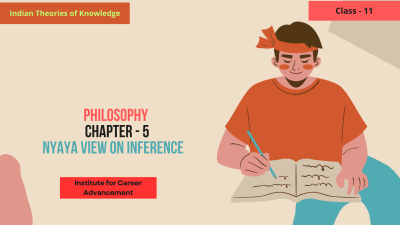
 Compare
Compare
The Nyaya school of Indian philosophy considers inference (Anumana) as one of the primary means of acquiring knowledge. It involves a logical process of reasoning from a known fact (the middle term or linga) to an unknown fact (the conclusion or sadhya). The Nyaya system outlines a five-step process for valid inference: Statement of the thesis (pratijnya): This is the assertion of the conclusion to be proved. Statement of the reason (hetu): This is the statement of the middle term or the reason for the conclusion. Statement of the instance (udaharana): This is an example illustrating the invariable concomitance between the middle term and the major term. Application of the reason to the instance (upanaya): This is the application of the general rule to the specific case. Conclusion (nigamana): This is the final assertion of the conclusion. The Nyaya school emphasizes the importance of the middle term and its invariable concomitance with the major term. This ensures the validity of the inference and distinguishes it from mere guesswork or speculation. ভারতীয় দর্শনের ন্যায় ধারা অনুমানকে (অনুমানা) জ্ঞান অর্জনের অন্যতম প্রাথমিক মাধ্যম হিসাবে বিবেচনা করে। এটি একটি জ্ঞাত তথ্য (মধ্য শব্দ বা লিঙ্গ) থেকে একটি অজানা তথ্য (উপসংহার বা সাধ্যা) পর্যন্ত যুক্তির একটি যৌক্তিক প্রক্রিয়া জড়িত। ন্যায় ব্যবস্থায় বৈধ অনুমানের জন্য একটি পাঁচ ধাপের প্রক্রিয়ার রূপরেখা দেওয়া হয়েছেঃ থিসিসের বিবৃতি (প্রতিজ্ঞান) এটি প্রমাণ করার জন্য উপসংহারের দাবি। কারণের বিবৃতি (হেটু) এটি মধ্যম পদের বিবৃতি বা উপসংহারের কারণ। দৃষ্টান্তের বিবৃতি (উদারানা) এটি মধ্যম পদ এবং প্রধান পদের মধ্যে অপরিবর্তনীয় সঙ্গতির একটি উদাহরণ। দৃষ্টান্তের কারণের প্রয়োগ (উপনয়) এটি নির্দিষ্ট ক্ষেত্রে সাধারণ নিয়মের প্রয়োগ। উপসংহার (নিগমনা) এটি উপসংহারের চূড়ান্ত দাবি। ন্যায় ধারা মধ্যম মেয়াদের গুরুত্ব এবং প্রধান মেয়াদের সঙ্গে এর অপরিবর্তনীয় সঙ্গতির উপর জোর দেয়। এটি অনুমানের বৈধতা নিশ্চিত করে এবং এটিকে নিছক অনুমান বা অনুমান থেকে আলাদা করে।
0 Lessons
Hours

 Compare
Compare
The Buddhist view on indeterminate perception differs significantly from the Nyaya perspective. While Nyaya recognizes both indeterminate and determinate perception, Buddhists argue that only indeterminate perception exists. According to Buddhist philosophy, indeterminate perception is a direct, unanalyzed awareness of an object without any conceptual overlay. It is a pure, unfiltered experience devoid of labels, categories, or judgments. This pure perception is considered the only valid form of knowledge. Buddhists believe that determinate perception, which involves categorizing and conceptualizing the object, is a product of mental fabrication and is prone to error. The mind imposes its own interpretations and constructs on the raw sensory data, leading to a distorted view of reality. Therefore, the Buddhist perspective emphasizes the importance of mindfulness and meditation to cultivate pure, unfiltered perception and to overcome the limitations of conceptual thought. অনির্দিষ্ট উপলব্ধি সম্পর্কে বৌদ্ধ দৃষ্টিভঙ্গি ন্যায় দৃষ্টিকোণ থেকে উল্লেখযোগ্যভাবে পৃথক। যদিও ন্যায় অনির্দিষ্ট এবং নির্ধারিত উপলব্ধি উভয়কেই স্বীকৃতি দেয়, বৌদ্ধরা যুক্তি দেয় যে শুধুমাত্র অনির্ধারিত উপলব্ধি বিদ্যমান। বৌদ্ধ দর্শন অনুসারে, অনির্ধারিত উপলব্ধি হল কোনও ধারণাগত আচ্ছাদন ছাড়াই কোনও বস্তুর প্রত্যক্ষ, বিশ্লেষণহীন সচেতনতা। এটি লেবেল, বিভাগ বা বিচার ছাড়াই একটি বিশুদ্ধ, ফিল্টারবিহীন অভিজ্ঞতা। এই বিশুদ্ধ উপলব্ধি জ্ঞানের একমাত্র বৈধ রূপ হিসাবে বিবেচিত হয়। বৌদ্ধরা বিশ্বাস করেন যে নির্ধারিত উপলব্ধি, যার মধ্যে বস্তুটিকে শ্রেণীবদ্ধ করা এবং ধারণাগত করা জড়িত, মানসিক বানোয়াটের একটি পণ্য এবং ত্রুটি প্রবণ। মন তার নিজস্ব ব্যাখ্যা আরোপ করে এবং কাঁচা সংবেদনশীল তথ্যের উপর গঠন করে, যা বাস্তবতার একটি বিকৃত দৃষ্টিভঙ্গির দিকে পরিচালিত করে। অতএব, বৌদ্ধ দৃষ্টিভঙ্গি বিশুদ্ধ, অপরিশোধিত উপলব্ধি গড়ে তুলতে এবং ধারণাগত চিন্তার সীমাবদ্ধতা কাটিয়ে উঠতে মননশীলতা এবং ধ্যানের গুরুত্বের উপর জোর দেয়।
0 Lessons
Hours
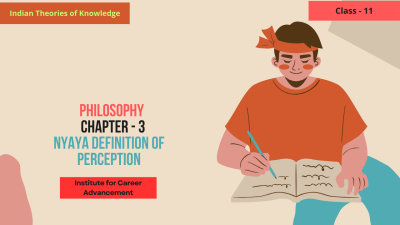
 Compare
Compare
According to the Nyaya school of Indian philosophy, perception (Pratyaksha) is defined as: Arising from the contact of a sense organ with its object: This means that perception is a result of the interaction between our senses (sight, hearing, touch, taste, and smell) and the external world. Non-verbal: Perception is not dependent on language or verbal descriptions. It is a direct experience of the object. Non-erroneous: Perception is considered to be a reliable source of knowledge, free from error. Determinate: Perception provides specific information about the object, including its qualities and relations. The Nyaya school distinguishes between two types of perception: Indeterminate Perception (Nirvikalpa Pratyaksha): This is the initial, unanalyzed perception of an object as a mere "something." Determinate Perception (Savikalpa Pratyaksha): This is the subsequent, analyzed perception of an object, where its qualities and relations are recognized. The Nyaya definition of perception emphasizes its directness, reliability, and informative nature, making it a fundamental source of knowledge. ভারতীয় দর্শনের ন্যায় মতবাদ অনুসারে, উপলব্ধি (প্রত্যক্ষা) কে এভাবে সংজ্ঞায়িত করা হয়ঃ বস্তুর সঙ্গে ইন্দ্রিয়ের যোগাযোগ থেকে উদ্ভূত হওয়াঃ এর অর্থ হল উপলব্ধি হল আমাদের ইন্দ্রিয় (দৃষ্টি, শ্রবণ, স্পর্শ, স্বাদ এবং গন্ধ) এবং বাহ্যিক জগতের মধ্যে মিথস্ক্রিয়ার ফলাফল। অ-মৌখিকঃ উপলব্ধি ভাষা বা মৌখিক বর্ণনার উপর নির্ভরশীল নয়। এটি বস্তুটির একটি সরাসরি অভিজ্ঞতা। অ-ত্রুটিপূর্ণঃ উপলব্ধি জ্ঞানের একটি নির্ভরযোগ্য উৎস হিসাবে বিবেচিত হয়, যা ত্রুটিমুক্ত। নির্ধারণঃ উপলব্ধি বস্তুটির গুণাবলী এবং সম্পর্ক সহ নির্দিষ্ট তথ্য সরবরাহ করে। ন্যায় মতবাদ দুই ধরনের উপলব্ধির মধ্যে পার্থক্য করেঃ অনির্ধারিত উপলব্ধি (নির্ভিকাল্প প্রত্যক্ষা) এটি একটি বস্তুকে নিছক "কিছু" হিসাবে প্রাথমিক, বিশ্লেষণহীন উপলব্ধি। উপলব্ধি নির্ধারণ (সাবিকল্প প্রত্যক্ষা) এটি একটি বস্তুর পরবর্তী, বিশ্লেষণকৃত উপলব্ধি, যেখানে এর গুণাবলী এবং সম্পর্কগুলি স্বীকৃত হয়। উপলব্ধির ন্যায় সংজ্ঞাটি এর প্রত্যক্ষতা, নির্ভরযোগ্যতা এবং তথ্যমূলক প্রকৃতির উপর জোর দেয়, যা এটিকে জ্ঞানের একটি মৌলিক উৎস করে তোলে।
0 Lessons
Hours
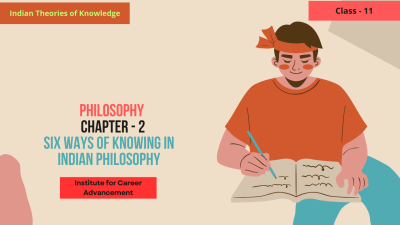
 Compare
Compare
Indian philosophy recognizes six primary ways of knowing, known as Pramanas: Pratyaksha (Perception): Knowledge gained through direct sensory experience. Anumana (Inference): Knowledge derived from reasoning and logical deduction. Upamana (Comparison): Knowledge acquired through analogy or similarity. Sabda (Verbal Testimony): Knowledge gained from reliable sources like scriptures or experts. Arthapatti (Postulation): Knowledge inferred from circumstantial evidence. Anupalabdhi (Non-perception): Knowledge gained from the absence of something. These Pramanas provide a framework for understanding the nature of knowledge and the different ways in which it can be acquired. They are central to Indian epistemology and have been debated and refined by various philosophical schools throughout history. ভারতীয় দর্শন জ্ঞানের ছয়টি প্রাথমিক উপায়কে স্বীকৃতি দেয়, যা প্রমাণ নামে পরিচিতঃ প্রত্যক্ষ ইন্দ্রিয় অভিজ্ঞতার মাধ্যমে প্রাপ্ত প্রত্যক্ষা (উপলব্ধি) জ্ঞান। অনুমানা (অনুমান) যুক্তি এবং যৌক্তিক অনুমান থেকে প্রাপ্ত জ্ঞান। উপমান (তুলনা) সাদৃশ্য বা সাদৃশ্যের মাধ্যমে অর্জিত জ্ঞান। সবদা (মৌখিক সাক্ষ্য) শাস্ত্র বা বিশেষজ্ঞদের মতো নির্ভরযোগ্য উৎস থেকে প্রাপ্ত জ্ঞান। অর্থপট্টি (অনুমান) জ্ঞান পরিস্থিতিগত প্রমাণ থেকে অনুমান করা হয়। অনুপলব্ধি (অ-উপলব্ধি) জ্ঞান কোনও কিছুর অনুপস্থিতি থেকে অর্জিত হয়। এই প্রমাণগুলি জ্ঞানের প্রকৃতি এবং এটি অর্জনের বিভিন্ন উপায় বোঝার জন্য একটি কাঠামো সরবরাহ করে। এগুলি ভারতীয় জ্ঞানতত্ত্বের কেন্দ্রবিন্দু এবং ইতিহাস জুড়ে বিভিন্ন দার্শনিক বিদ্যালয় দ্বারা বিতর্কিত ও পরিমার্জিত হয়েছে।
0 Lessons
Hours
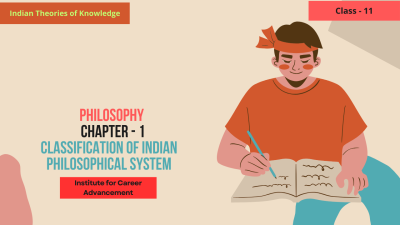
 Compare
Compare
Indian philosophical systems are broadly classified into two categories: 1. Orthodox (Astika) Schools: Vaisheshika: Focuses on the analysis of reality into atomic substances and their properties. Nyaya: Emphasizes logical reasoning and inference as the means to attain knowledge. Samkhya: Deals with the dualistic nature of reality, comprising matter (prakriti) and consciousness (purusha). Yoga: Primarily concerned with the practice of meditation and self-discipline to attain liberation. Mimamsa: Investigates the nature of dharma (duty) as revealed in the Vedas. Vedanta: Explores the ultimate nature of reality (Brahman) and its relationship with the individual soul (Atman). 2. Heterodox (Nastika) Schools: Carvaka: A materialistic philosophy that rejects the authority of the Vedas and emphasizes empirical evidence. Buddhism: Teaches the Four Noble Truths and the path to liberation through the elimination of suffering. Jainism: Advocates non-violence (ahimsa) and the doctrine of Anekantavada (many-sidedness of truth). These philosophical systems offer diverse perspectives on the nature of reality, the human condition, and the path to liberation. They have significantly influenced Indian thought and continue to be studied and debated today. ভারতীয় দার্শনিক ব্যবস্থাকে মোটামুটিভাবে দুটি শ্রেণীতে ভাগ করা হয়েছেঃ 1টি। অর্থোডক্স (আস্তিকা) স্কুলঃ বৈশেষিকাঃ পারমাণবিক পদার্থ এবং তাদের বৈশিষ্ট্যগুলিতে বাস্তবতার বিশ্লেষণের উপর দৃষ্টি নিবদ্ধ করে। ন্যায়ঃ জ্ঞান অর্জনের মাধ্যম হিসাবে যৌক্তিক যুক্তি এবং অনুমানের উপর জোর দেয়। সাংখ্যঃ বাস্তবতার দ্বৈতবাদী প্রকৃতির সাথে মোকাবিলা করে, যার মধ্যে পদার্থ (প্রকৃতি) এবং চেতনা (পুরুষ) রয়েছে যোগঃ প্রাথমিকভাবে মুক্তি অর্জনের জন্য ধ্যান এবং আত্ম-শৃঙ্খলা অনুশীলনের সাথে সম্পর্কিত। মীমাংসাঃ বেদে প্রকাশিত ধর্মের (কর্তব্য) প্রকৃতি অনুসন্ধান করে। বেদান্তঃ বাস্তবতার চূড়ান্ত প্রকৃতি (ব্রহ্ম) এবং স্বতন্ত্র আত্মার (আত্মা) সাথে এর সম্পর্ক অন্বেষণ করে। 2. হেটেরোডক্স (নাস্তিকা) স্কুলঃ কার্ভকঃ একটি বস্তুবাদী দর্শন যা বেদের কর্তৃত্বকে প্রত্যাখ্যান করে এবং অভিজ্ঞতাগত প্রমাণের উপর জোর দেয়। বৌদ্ধধর্মঃ চারটি মহৎ সত্য এবং দুর্ভোগ দূরীকরণের মাধ্যমে মুক্তির পথ শেখায়। জৈনধর্মঃ অহিংসা (অহিংসা) এবং অনেকান্তবাদ (সত্যের বহু-পক্ষীয়তা) মতবাদকে সমর্থন করে। এই দার্শনিক ব্যবস্থাগুলি বাস্তবতার প্রকৃতি, মানুষের অবস্থা এবং মুক্তির পথ সম্পর্কে বিভিন্ন দৃষ্টিভঙ্গি প্রদান করে। এগুলি ভারতীয় চিন্তাভাবনাকে উল্লেখযোগ্যভাবে প্রভাবিত করেছে এবং আজও অধ্যয়ন ও বিতর্ক অব্যাহত রয়েছে।
0 Lessons
Hours

 Compare
Compare
Sukhini imang(সুখিনিনি ইমাঙ)Kokbom swinai wngkha swikwrwng Rabindra kishore Debbarma(রবীন্দ্র কিশোর দেববর্মা) O kokbomni bisingtwi swikwrwng sana nai kha nukhung khungsa bwta bahanok ni bising hamjak lai ma khairokma tongmanirogno bwta wngkha Boren tei bahanok wngkha Sukhin.Boren bahanok no twiwi kwngmani imang wamani kok tei o jora no sukhini sak hamya tei ochai lolang bai bo mwtai nai rwmani nukjak kha abono wngjakya wngwi bwta Boren tei kaisa kamini Biresh mungwi daktor khoroksa no tubu phaio.Sukhini belai sak hamya bari jak leng lengwi kwlaijak aboni bisini a daktar Biresh kong injection riui pai bo sukhini sak hamya komiya tei biresh aguli bithi pai nani thangnani nanganw hinui bwta Boren-ni thanini rang twlangwi khar thangkha
1 Lessons
Hours